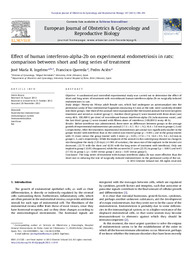Title:
Effect of human interferon-alpha-2b on experimental endometriosis in rats: comparison between short and long series of treatment |
Authors:
Rodríguez Ingelmo, José María
Quereda, Francisco 
Acién, Pedro  |
Editor:
Elsevier [Commercial Publisher] |
Department:
Departamentos de la UMH::Salud Pública, Historia de la Ciencia y Ginecología |
Issue Date:
2013-04 |
URI:
https://hdl.handle.net/11000/30944 |
Abstract:
Objective: A randomised and controlled experimental study was carried out to determine the effect of
short and long series of treatment with recombinant human interferon-alpha-2b on surgically induced
endometriosis in rats.
Study design: Ninety-six Wistar adult female rats, which had undergone an autotransplant into the
peritoneal cavity of four endometrial fragments measuring 4.5 mm at the side, were randomly divided
into three groups. One third of the animals were manipulated like the treated animals but were not given
treatment and served as control (group C). Another third (group S) were treated with three doses (one
every 48 h, 100,000 U per dose) of recombinant human interferon-alpha-2b (subcutaneous route), and
the last third (group L) were treated with fifteen doses of interferon (100,000 U every 48 h).
Results: Before interferon was administered, there were no differences between groups in the average
growth of experimental endometriosis per animal (17.3 6.7, 18.1 9.2, 16.4 5.6 mm in groups C, S and
L respectively). After the treatment, experimental endometriosis per animal was significantly smaller in the
groups treated with interferon than in the control non-treated group (p < 0.001), and in the group treated
with 15 doses versus the group treated with 3 doses (p < 0.05), (17.6 7.5, 14.0 9.5, 9.4 6.0 mm in
groups C, S, and L respectively). While the implants of the animals in the control group showed no change in
size throughout the study (120 days) (+1.96% of variation), the mean size of the implants in the treated rats
decreased, (22.7% with the short and 42.8% with the long series of treatment with interferon). Only one
implant in group C (0.8%) disappeared, while this occurred in 27 cases (22.5%) in group S (p < 0.001) and in 45
(37.5%) in group L (p < 0.001 versus group C and p < 0.05 versus group S).
Conclusion: The long series of treatment with human interferon-alpha-2b was more effective than the
short one in reducing the size of surgically induced endometriosis in the peritoneal cavity of the rat.
|
Keywords/Subjects:
Experimental endometriosis
Immunological system
Immunomodulation
Interferon
Rat |
Type of document:
info:eu-repo/semantics/article |
Access rights:
info:eu-repo/semantics/openAccess |
DOI:
https://doi.org/10.1016/j.ejogrb.2012.11.019 |
Published in:
European Journal of Obstetrics & Gynecology and Reproductive Biology
Supports open acces Volume 167, Issue 2, April 2013, Pages 190-193 |
Appears in Collections:
Artículos Salud Pública, Historia de la Ciencia y Ginecología
|

.png)
